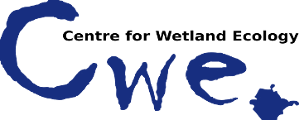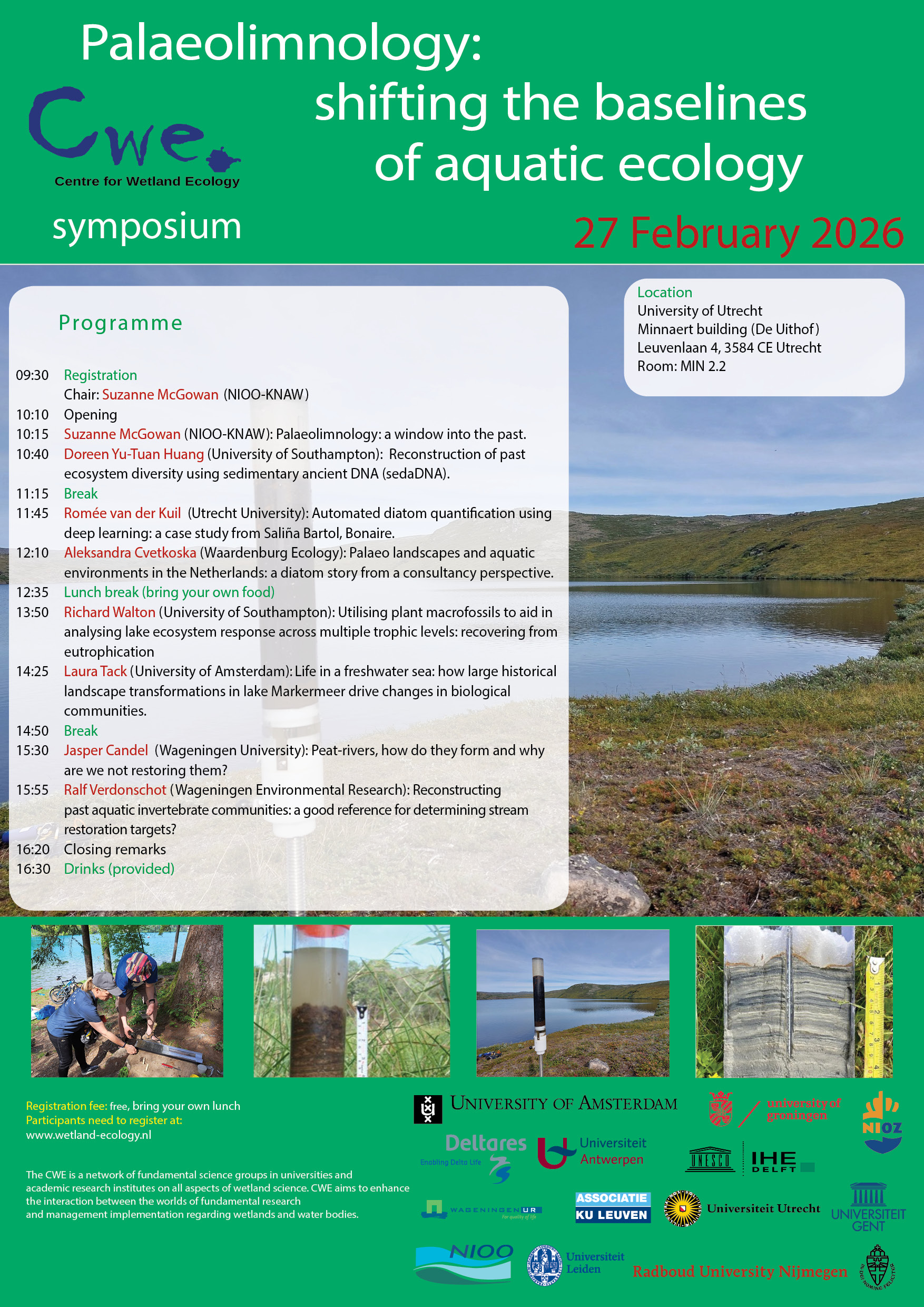Centre for Wetland Ecology
The Centre for Wetland Ecology: a scientific network
Dutch and Flemish aquatic and wetland researchers form the Centre for Wetland Ecology (CWE).
Mission
Since 2000 the CWE has been providing a network and scientific platform for research on ecology, biogeochemistry, microbiology and hydrology of wetlands and water bodies. Novel research is shared and discussed in two yearly symposia and two newsletters provide the latest updates on wetland or aquatic projects and events. The CWE can also act as a partner in initiatives from the applied water sector to tackle water-related questions by representing the science community.
Palaeosymposium 2026
Most aquatic ecological studies are conducted over short timescales and yet lakes and wetlands have been subjected to decades and centuries of anthropogenic change. Palaeolimnology (sediment core analysis) can reconstruct past aquatic ecosystem dynamics and functions beyond the timescales of the longest monitoring programmes, providing unprecedented information on ecological baselines and rates of change. We will showcase contrasts and synergies on topics including diatoms and machine learning, restoration of stream meandering, lake restoration, and how to apply DNA techniques to assess current and past biodiversity.
Register for the Palaeosymposium 2026
Participants
Deltares - Department of Water quality and Freshwater Ecology
Ghent University - Aquatic Ecology
IHE Delft - Department of Water Science and Engineering
KU Leuven - Laboratory of Aquatic Ecology, Evolution and Conservation
Netherlands Institute of Ecology (NIOO-KNAW) - Aquatic Ecology
Radboud University Nijmegen - Department of Ecology
Rijksuniversiteit Groningen - Community and Conservation Ecology
University of Amsterdam - IBED
University of Antwerp - Departement Biologie
Utrecht University - Ecology and Biodiversity / Palaeoecology / Copernicus Institute of Sustainable Development
Wageningen Environmental Research - Zoetwaterecologie
Wageningen UR - Aquatic Ecology and Water Quality Management
Previous symposia
Twice a year, the CWE organizes a symposium. Below you find the all previous editions.
2023 Past, present and future of wetland functioning and restoration
2019 Perspectives in Aquatic Ecology
2019 Aquatic microbiomes: Impact in man-made and natural ecosystems
2019 Future of rivers and streams: ecology and restoration under global change
2018 Towards renewable energy: opportunities and consequences for freshwater and marine ecosystems
2017 Future of aquatic carbon: impacts, feedbacks and mitigation
2017 Multiple stressors and ecological complexity in aquatic systems
2016 From Wadden Sea to Marker Wadden: functioning and restoration of large aquatic ecosystems
2016 The good, the bad or a bit of both? The role of exotic species in aquatic ecosystems
2015 Half a century of fundamental and applied wetland ecology: from acidification to climate change
2015 Growing Peat: New Opportunities and Challenges for the Restoration of Peatlands
2015 Back to the future, the ecological reshaping of Dutch waters
2014 Constructed wetlands: challenges and opportunities
2014 Climate change and wetlands
2013 Getting to the bottom of wetland functioning: the sediment-water interface
2013 Understanding wetland dynamics: the value of long-term datasets
2012 Stream restoration: beyond geomorphology
2012 Beyond eutrophication: towards a better ecological quality of shallow lakes
2011 Eutrophication: top-down or bottom-up control?
2010 Wetland Restoration: It's all about dispersal, germination, establishment and succession
2010 Biogeochemical processes in wetlands
Contact
General information
Casper van Leeuwen (chair)
CWE Board
| Casper van Leeuwen | Radboud University Nijmegen (Chair) |
| Harm van der Geest | University of Amsterdam |
| Dedmer van de Waal | Netherlands Institute of Ecology |
| Ellen van Donk | Netherlands Institute of Ecology |
| Annelies Veraart | Radboud University Nijmegen |
| Patrick Meire | University of Antwerp |
| Ralf Verdonschot | Wageningen University and Research |
| Ralph Temmink | Utrecht University |
Representatives applied sector
| Tessa van der Wijngaart | STOWA |
| Miguel Dionisio Pires | Deltares |

